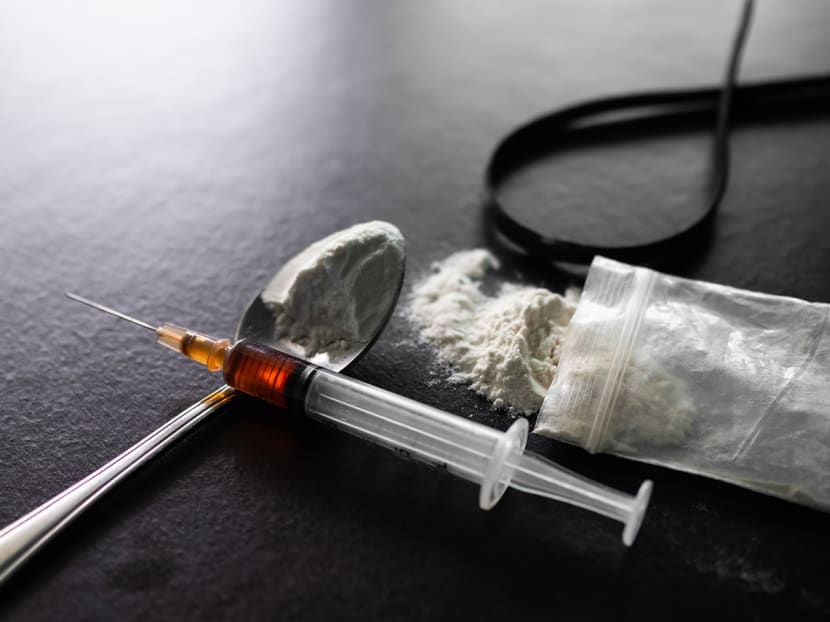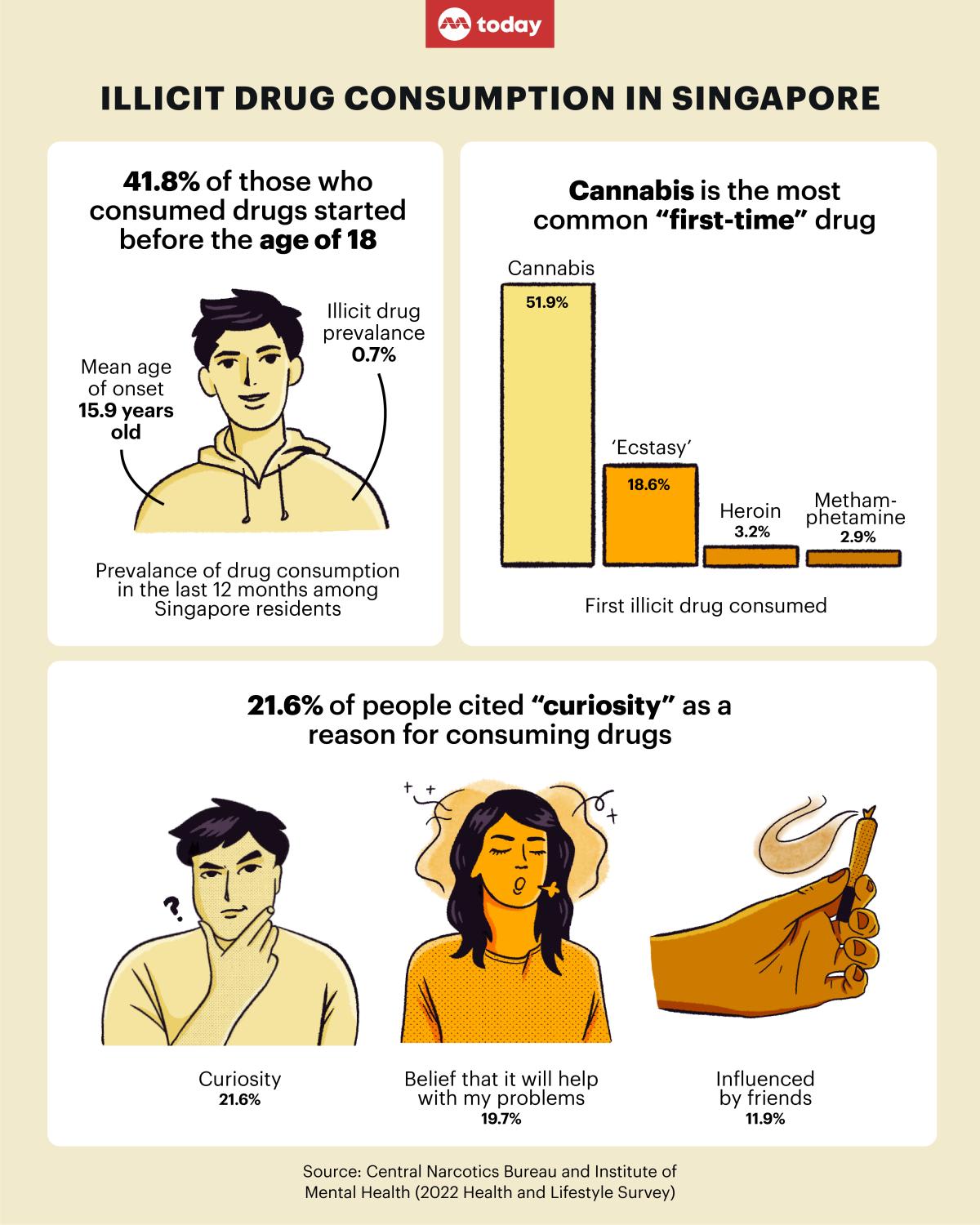Drug abuse 'starts young' at under 16 years old, 0.7% of S'pore residents have taken illegal drugs in past year: IMH study
SINGAPORE — Carol Wee was only 13 years old when she first got addicted to heroin, leading her down a tumultuous path of drug abuse with bad company and painful estrangement from her family.

- An Institute of Mental Health study found that around 0.7 per cent of all Singapore residents have taken illegal drugs at least once in the past year
- More than four in 10 of those who consumed drugs stated that they have done so before they turned 18
- The mean age of the onset of illegal drug consumption was 15.9 years old
SINGAPORE — Carol Wee was only 13 years old when she first got addicted to heroin, leading her down a tumultuous path of drug abuse with bad company and painful estrangement from her family.
Recalling how she felt trapped and unable to seek help, Ms Wee recalled to TODAY how she decided to surrender herself to the police with a urine test within two years of first taking the drug.
"I told the officer: 'I know I'm positive, but I don't know where else to go'," said Ms Wee, now aged 42. She added that as an orphan, she started sniffing glue at 13 and once went through urine supervision with the police after her aunt caught her with heroin and reported her.
Cases of former drug abusers like Ms Wee, who started the deadly habit during their teenage years, are not isolated ones, with an Institute of Mental Health (IMH) study on Wednesday (May 3) concluding that more than four in 10 of those who consumed drugs stated that they have done so before they turned 18.
The study also found that the mean age that people started consuming drugs is 15.9 years old. Nearly half who have taken drugs indicated that they had started with cannabis.
The study also found that around 0.7 per cent of all Singapore residents have taken illegal drugs at least once in the past year.
A total of 6,509 Singapore residents, aged 15 to 65, participated in the study from April 2021 to July 2022, which falls largely during the Covid-19 pandemic.
They were picked using a “disproportionate stratified sampling method”, said IMH, which means that the selected participants were representative of Singapore’s resident population by age, race, gender and citizenship status.
Speaking about the study at the Central Narcotics Bureau's (CNB) workplan seminar on Wednesday, Senior Minister and Coordinating Minister for National Security Teo Chee Hean said the survey results affirmed CNB's drug-control approach, but the findings on the prevalence of drug abuse at a young age were "worrying".
Although figures such as 0.7 per cent of respondents having consumed drugs in the past 12 months might seem like a minuscule number, "when multiplied out across the population, this translates potentially to about 18,000 residents", he said.
CNB said in a statement that it had looked at “aggregated findings” from the study, indicating that the agency does not know the identities of the respondents and what they said to IMH researchers.

WHY IT MATTERS
Singapore adopts harsh policies against drug consumption and trafficking, and Singaporeans have a negative perception of drugs, according to several polls over the years.
For instance, a Ministry of Home Affairs survey conducted in 2018 indicated a strong support for a tough stance against drugs, a near universal acknowledgement of the harms of drugs, and positive sentiment towards Singapore’s drug situation and laws.
To understand how drugs are used by Singapore residents and the scale of the drug scourge here, however, require a different type of study.
Previous studies by CNB are largely based on enforcement and conviction statistics, For example, CNB's latest report in 2022 found that among drug offenders who were arrested in 2022, those under the age of 30 made up half of all new abusers.
The IMH study, on the other hand, is a type of "prevalence" study, which means that it is a study of a population of respondents comprising those who may or may not be drug abusers. It is the first study of drug abuse in Singapore to use this method.
The release of the IMH survey also follows a global trend of the legalisation of cannabis, also known as marijuana, in several countries, notably Thailand in June 2022.
WHAT THE STUDY FOUND
The study found that cannabis is the illicit drug consumed most frequently among respondents who said they have taken drugs.
- Nearly half (45.9 per cent) of respondents who had taken drugs in the past 12 months consumed cannabis
- Other drugs consumed by respondents included "Ecstasy" (by 21.2 per cent of respondents), methamphetamine (18.5 per cent) and heroin (11.2 per cent)
- Cannabis is also the most common first illicit drug consumed. About 51.9 per cent of respondents who had taken drugs before said that cannabis was their first foray
Strict laws, awareness are top reasons for staying away from drugs
- Around 74.4 per cent of respondents said that legal consequences was a reason for steering clear of drugs.
- Chances of being arrested (65.4 per cent) and awareness of adverse effects on health (65.4 per cent) were also cited as reasons
Majority of respondents view illicit drugs to be "very harmful"
- Respondents rated drug consumption, alcohol use and smoking on a scale of harmless to very harmful
- About 82.1 per cent of respondents said that illicit drug consumption was "very harmful"
- In comparison, smoking and alcohol use were rated as "very harmful" by 45.3 per cent and 21.4 per cent of respondents respectively
Methamphetamine and heroin perceived as drugs with greater risk of harm
- Respondents asked to indicate the risk of harm of several drug types and the frequency of consumption of the drug
- Drugs named ranged from cannabis, heroin, methamphetamine and new psychoactive substances (NPS)
- Regular heroin and methamphetamine consumption ranked highest, at 86 per cent and 81.4 per cent respectively
- In comparison, regular cannabis and NPS consumption were ranked slightly lower. 72.8 per cent of respondents said that regular cannabis consumption would lead to great risk of harm, while 76.5 per cent said the same of NPS
- Occasional consumption of cannabis was ranked the lowest. 61.2 per cent of respondents said that occasional cannabis consumption would lead to great risk of harm
Illicit drug consumption starts young
- About 0.7 per cent of Singapore residents had taken illicit drugs in the last 12 months (from survey date)
- Out of the 0.7 per cent of residents, the mean age that they started drug consumption was 15.9 years old
- Around 41.8 per cent had consumed drugs before the age of 18
Residences, overseas are common locations for illicit drug consumption
- Drugs were consumed by respondents in either their home (30.1 per cent), in a friend's home (19.1 per cent), or overseas (9.5 per cent)
- These findings are likely to be influenced by pandemic measures as the survey was conducted between April 2021 and July 2022
Peer influence is among top reasons for consumption
- About 21.6 per cent of respondents indicated that a reason for consuming drugs was curiosity
- Meanwhile, 19.7 per cent of respondents cited a "belief that it will help (their) problems" as a reason
- Peer influence also was a reason for 11.9 per cent of respondents
WHAT EXPERTS SAY
The high number of youth drug abusers is not surprising to Dr Sandor Heng, senior clinical psychologist at Promises Healthcare.
“Views on drugs are influenced by the information made available on the internet,” Dr Heng said. “Also, accessibility to drugs is greater than ever.”
Youths may display novelty-seeking and risk-taking behaviours, because the part of the brain that plays an important role in functioning is still developing, Dr Heng said.
During this period of development, a youth might outgrow his or her sensitivity to punishment, and impulse control becomes an issue to contend with, he said.
“It’s also worth noting that there are many reasons why an individual will engage with drug abuse, regardless of age. It is essential to explore biological, psychological, social, and spiritual factors that may play a contributory role.”
Dr Lambert Low, consultant at IMH’s national addictions management service said focusing on the social and familial factor is one of a few protective measures against drug abuse.
“Where drug use has already occurred, a change of environment and lifestyle as well as keeping away from their circle of drug-using friends can help to reduce a young drug abuser’s risks of relapse,” Dr Low said.
“Therefore, it is important to engage in more upstream, preventive measures starting within the family unit.”
These include:
- A strong rapport between the parents and adolescents
- Close supervision and monitoring of the adolescent’s peer activities
- Religion and spirituality
- Active participation in various school activities such as sports and recreational activities
“Having appropriate social and family support, and regular engagement with our youth is key to the prevention of drug use,” he said.











